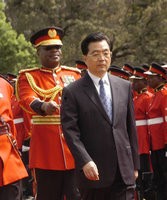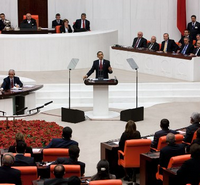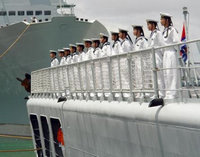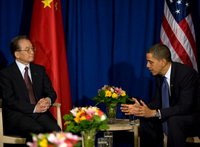Monday, November 1, 2010 at 9:14 AM
9:14AM
 Monday, November 1, 2010 at 9:14AM
Monday, November 1, 2010 at 9:14AM
 Writing recently in the Financial Times, long-time economic journalist Gideon Rachman lamented the passing of a post-Cold War "golden age," in which "countries shared a belief in globalization and Western democratic values." In Rachman's calculation, that consensus has been battered by the global financial crisis, which ushered in a "new, less-predictable era."
Writing recently in the Financial Times, long-time economic journalist Gideon Rachman lamented the passing of a post-Cold War "golden age," in which "countries shared a belief in globalization and Western democratic values." In Rachman's calculation, that consensus has been battered by the global financial crisis, which ushered in a "new, less-predictable era."
Rachman, whose book entitled "Zero-Sum Future" comes out next February, is clearly prepping the literary battlefield by positioning himself as an "anti-Robert Wright." The latter's book, "Non-Zero: The Logic of Human Destiny," argued that human progress has been characterized by -- and thus depends on -- our increasing appreciation for and adoption of cooperative behaviors. So when Rachman predicts more unpredictability, he's really predicting less cooperation and more conflict -- today's currency wars translated into tomorrow's shooting wars.
Read the entire column at World Politics Review.
Monday, October 25, 2010 at 8:44 AM
8:44AM
 Monday, October 25, 2010 at 8:44AM
Monday, October 25, 2010 at 8:44AM
 The Nobel Committee's decision to award jailed Chinese democracy activist Liu Xiaobo the 2010 Peace Prize came just days before China's Communist Party elite anointed political princeling Xi Jinping as President Hu Jintao's clear successor, highlighting the two Chinas that now seem to be passing one another like ships in the night. One China is propelled from below by a coastal workforce that is increasingly self-confident in its skills and accomplishments and growing income. The other, larger China is managed from above by political leaders who increasingly worry over the nation's social stability as they grow more self-defensive in their ruling style.
The Nobel Committee's decision to award jailed Chinese democracy activist Liu Xiaobo the 2010 Peace Prize came just days before China's Communist Party elite anointed political princeling Xi Jinping as President Hu Jintao's clear successor, highlighting the two Chinas that now seem to be passing one another like ships in the night. One China is propelled from below by a coastal workforce that is increasingly self-confident in its skills and accomplishments and growing income. The other, larger China is managed from above by political leaders who increasingly worry over the nation's social stability as they grow more self-defensive in their ruling style.
Read the entire column at World Politics Review.
Monday, October 11, 2010 at 10:02 AM
10:02AM
 Monday, October 11, 2010 at 10:02AM
Monday, October 11, 2010 at 10:02AM
 After having cooperated to an unprecedented degree -- on stimulus spending and new bank rules, for instance -- to avoid a global meltdown these past two years, the world's major economies now appear ready to turn on one another with truly self-destructive vengeance. Poorly informed Americans are increasingly convinced that free trade pacts -- and not our uniquely high corporate tax rates -- are responsible for sending jobs overseas, and they want to see China punished with tariffs on its imports for its undervalued currency. With China's neighbors intervening heavily to keep their own currencies from rising too high in response, global chatter about the unfolding "currency war" has reached a fever pitch. Is this any way to manage a tenuous global economic recovery?
After having cooperated to an unprecedented degree -- on stimulus spending and new bank rules, for instance -- to avoid a global meltdown these past two years, the world's major economies now appear ready to turn on one another with truly self-destructive vengeance. Poorly informed Americans are increasingly convinced that free trade pacts -- and not our uniquely high corporate tax rates -- are responsible for sending jobs overseas, and they want to see China punished with tariffs on its imports for its undervalued currency. With China's neighbors intervening heavily to keep their own currencies from rising too high in response, global chatter about the unfolding "currency war" has reached a fever pitch. Is this any way to manage a tenuous global economic recovery?
Read the entire column at World Politics Review.
Monday, October 4, 2010 at 10:26 AM
10:26AM
 Monday, October 4, 2010 at 10:26AM
Monday, October 4, 2010 at 10:26AM
 America's top African diplomat recently signaled Washington's desire to establish more official contacts with the autonomous region of Somaliland, which sits within the internationally recognized borders of the failed state known as Somalia. Meanwhile, both our Agency for International Development and the Pentagon's recently established Africa Command worry about Sudan's upcoming vote on formally splitting the country in two. For a country that has sworn off nation-building, it's interesting to see just how hard it is for America to remain on the sidelines while globalization remaps so much of the developing world.
America's top African diplomat recently signaled Washington's desire to establish more official contacts with the autonomous region of Somaliland, which sits within the internationally recognized borders of the failed state known as Somalia. Meanwhile, both our Agency for International Development and the Pentagon's recently established Africa Command worry about Sudan's upcoming vote on formally splitting the country in two. For a country that has sworn off nation-building, it's interesting to see just how hard it is for America to remain on the sidelines while globalization remaps so much of the developing world.
Read the entire column at World Politics Review.
Monday, September 27, 2010 at 8:53 AM
8:53AM
 Monday, September 27, 2010 at 8:53AM
Monday, September 27, 2010 at 8:53AM

From the Arctic Council's website.
According to virtually all global warming projections, humanity faces significantly more conflict in the decades ahead as we fight over dwindling resources in climate-stressed lands. However, those reports typically overlook one likely outcome that could counterbalance the more negative impacts of global warming -- that of northern territories becoming significantly milder, more accessible, and, most intriguingly, more hospitable to immigration. This is the essential good news to be found in Laurence C. Smith's fascinating new book, "The World in 2050."
Read the entire column at World Politics Review.
 Read about the book because of Smith's piece in the WSJ, which I blogged. Asked Putnam for the book and got it pronto. Like I hint at in the piece, Smith's survey of futurism was only average and didn't really add anything to the book. I have no idea why he or his editors felt the need to promise "the world in 2050," because the text simply doesn't deliver. But the book-within-the-book on the "New North" was eye-popping. I would have loved to hear more about that and skip all the surveying.
Read about the book because of Smith's piece in the WSJ, which I blogged. Asked Putnam for the book and got it pronto. Like I hint at in the piece, Smith's survey of futurism was only average and didn't really add anything to the book. I have no idea why he or his editors felt the need to promise "the world in 2050," because the text simply doesn't deliver. But the book-within-the-book on the "New North" was eye-popping. I would have loved to hear more about that and skip all the surveying.
Monday, September 20, 2010 at 8:37 AM
8:37AM
 Monday, September 20, 2010 at 8:37AM
Monday, September 20, 2010 at 8:37AM

When Europe ran the world, trade followed the flag, meaning that globalization in its initial expression -- otherwise known as colonialism -- grew out of the barrel of a gun, to paraphrase Mao Zedong. On this subject, Franklin Roosevelt and Vladimir Lenin agreed, even if that conclusion led them to embrace diametrically opposed strategies: FDR's realization that "the colonial system means war" drove him to erect an international liberal trade order following World War II that doomed the vast colonial systems of his closest European allies. Roosevelt's success not only enabled America to contain and ultimately defeat the soul-crushing Soviet alternative, it laid the initial groundwork for today's American-style "open door" globalization, itself a nod to cousin Theodore. In the end, that "traitor to his class," as Roosevelt was often labeled, should rightfully be acknowledged as the single-most successful anti-imperialist revolutionary leader of the 20th century.
Read the entire column at World Politics Review.
I just participated--this morning--in my first virtual meeting of the Geopolitical Risk Global Agenda Council of the World Economic Forum as led by Eurasia Group CEO Ian Bremmer. I wrote this piece in anticipation of that, in effect offering my definition of the biggest geopolitical risk I could imagine: "declining" or "retreating" America + rising-but-pol-mil-weak China = a system whose revealed risk could suddenly spike. How so? Some scenario comes along that confirms US impotence or unwillingness to step into any new breaches, while likewise confirming the "paper tiger" nature of the PLA (shiny weapons + no experience makes Wang a tentative soldier). Then the question is, what or who steps into this breach? Rising secondary powers? Underpowered and/or atrophied international organizations? Or, most likely, is that breach simply left wide open, revealing the true macro geopol risk in the system--namely, that we stand astride a transition from an overburdened and overleveraged superpower to an inexperienced and lacking-in-will-and-political resilience newcomer? And what is the possibility of alliance between the two at this time? Poor indeed. You pile that geopol "revealed risk" on top of a fragile global recovery, and that's a dangerous mix.
Monday, September 13, 2010 at 9:09 AM
9:09AM
 Monday, September 13, 2010 at 9:09AM
Monday, September 13, 2010 at 9:09AM

If America could be magically granted its ideal Muslim strategic partner, what would we ask for? Would we want a country that fell in line with every U.S. foreign policy stance? Not if the regime was to have any credibility with the Islamic world. No, ideally, the government would be just Islamist enough to be seen as preserving the nation's religious and cultural identity, even as it aggressively modernized its society and connected its economy to the larger world. It would have an activist foreign policy that emphasized diplomacy, multilateralism and regional stability, while also maintaining sufficient independence from America to demonstrate that it was not Washington's proxy, but rather a confident great power navigating the currents of history. In sum, it would serve as an example to its co-religionists of how a Muslim state can progressively improve itself amid globalization's deepening embrace -- while remaining a Muslim state.
Read the entire column at World Politics Review
Monday, September 6, 2010 at 10:00 AM
10:00AM
 Monday, September 6, 2010 at 10:00AM
Monday, September 6, 2010 at 10:00AM
 America has entered a new phase in its Iraq operations, one that represents the end of the “lost war” to many, the non-combat continuation of nation-building to others, and a vague sense of a never-ending global security commitment to just about everyone. Americans, who crave clear definitions of success or failure, aren’t sure what to make of this turning point, especially since for many, their attention has already shifted to the Afghanistan-Pakistan region. Meanwhile, some pundits sound the alarm with cries of “permanent war,” even though we haven’t officially declared war on anybody since 1943. As for the rest of the planet, humanity currently enjoys the most systematically peaceful period in its recorded history.
America has entered a new phase in its Iraq operations, one that represents the end of the “lost war” to many, the non-combat continuation of nation-building to others, and a vague sense of a never-ending global security commitment to just about everyone. Americans, who crave clear definitions of success or failure, aren’t sure what to make of this turning point, especially since for many, their attention has already shifted to the Afghanistan-Pakistan region. Meanwhile, some pundits sound the alarm with cries of “permanent war,” even though we haven’t officially declared war on anybody since 1943. As for the rest of the planet, humanity currently enjoys the most systematically peaceful period in its recorded history.
Read the entire column at World Politics Review.
Monday, August 30, 2010 at 9:18 AM
9:18AM
 Monday, August 30, 2010 at 9:18AM
Monday, August 30, 2010 at 9:18AM

While the world doesn't yet face a food crisis on par with the summer of 2008, it's clear that the drought currently affecting the Black Sea trio of Russia, Ukraine and Kazakhstan -- all big-time global exporters of wheat and barley -- has suddenly made food inflation a primary threat to the somewhat fragile and decidedly uneven global economic recovery. At the very least, it reminds us just how tight global food markets are, due to the contradictory combination of rising middle-class demand and the enduring commitment by brittle governments around the world to keep prices low -- at whatever the cost.
Read the entire column at World Politics Review.
Monday, August 9, 2010 at 10:00 AM
10:00AM
 Monday, August 9, 2010 at 10:00AM
Monday, August 9, 2010 at 10:00AM

In late-July, Secretary of State Hillary Clinton gently put China on notice regarding its increasingly aggressive claims over the near-entirety of the South China Sea by proposing a formal international legal process to resolve territorial disputes there. Naturally, the Chinese were not pleased, but the proposal was a great move by the Obama administration. Every step that China takes to build up its military power naturally triggers a strong balancing desire throughout the rest of Asia. But with none of those far-smaller economies looking to anger “rising China,” somebody needs to give voice to those fears and create vehicles for organizing the sought-after balancing.
That somebody can only be the United States.
Read the rest of the column at World Politics Review.
Monday, July 26, 2010 at 9:48 AM
9:48AM
 Monday, July 26, 2010 at 9:48AM
Monday, July 26, 2010 at 9:48AM
There’s no question that globalization, in its modern American form of expanding free trade, just went through its worst crisis to date. But while economists debate whether or not we in the West are collectively heading toward a 1938-like “second dip,” it’s important to realize just how myopic our fears are about the future of a world economy that America went out of its way to create, defend, and grow these past seven decades.
See the references for my inspiration on this piece.
Monday, July 19, 2010 at 9:30 AM
9:30AM
 Monday, July 19, 2010 at 9:30AM
Monday, July 19, 2010 at 9:30AM

With his recent selections of Gens. David Petraeus and James Mattis for command in Afghanistan and Central Command respectively, President Barack Obama signals his understanding that his previously established deadline of mid-2011 to begin drawing down combat troops in the “good war” cannot be met. The two were co-architects of the military’s renewed embrace of both counterinsurgency operations and the associated nation-building project that by necessity goes along with it. Neither flag officer can be expected to preside over a Vietnam-like exit that once again puts troubled and untrustworthy Pakistan in charge of Afghanistan’s fate.
Read the rest of the column at World Politics Review.
Monday, July 12, 2010 at 9:04 AM
9:04AM
 Monday, July 12, 2010 at 9:04AM
Monday, July 12, 2010 at 9:04AM
 A growing population had long been considered a prime determinant of national strength -- at least until the “population bomb” crowd commandeered the dialogue almost a half-century ago and declared such growth to be a threat to human existence. But since then, with globalization’s rapid expansion encompassing the bulk of the developing world -- and specifically demographic behemoths India and China -- we’ve seen industrialization and urbanization work their usual magic on female fertility. As a result, humanity is now projected to top out as a species sometime mid-century and likely decline thereafter.
A growing population had long been considered a prime determinant of national strength -- at least until the “population bomb” crowd commandeered the dialogue almost a half-century ago and declared such growth to be a threat to human existence. But since then, with globalization’s rapid expansion encompassing the bulk of the developing world -- and specifically demographic behemoths India and China -- we’ve seen industrialization and urbanization work their usual magic on female fertility. As a result, humanity is now projected to top out as a species sometime mid-century and likely decline thereafter.
Read the entire column at World Politics Review.
Find the Kotkin book here.
Monday, July 5, 2010 at 9:30 AM
9:30AM
 Monday, July 5, 2010 at 9:30AM
Monday, July 5, 2010 at 9:30AM
 The goal of global partnership between the United States and China, the cornerstone of my strategic vision for the past half-decade, has taken a beating lately. The Great Recession has led too many Americans to doubt in our own economic system and political institutions, while encouraging undue appreciation of China’s. Similar trends can be seen on the Chinese side, with our system unduly discredited and theirs fantastically exalted. Is the world better-served by this growing Chinese hubris than it was by America’s recent bout of the same vice? Hardly. Zero-sum calculations have no place in this age of globalization’s rapid expansion.
The goal of global partnership between the United States and China, the cornerstone of my strategic vision for the past half-decade, has taken a beating lately. The Great Recession has led too many Americans to doubt in our own economic system and political institutions, while encouraging undue appreciation of China’s. Similar trends can be seen on the Chinese side, with our system unduly discredited and theirs fantastically exalted. Is the world better-served by this growing Chinese hubris than it was by America’s recent bout of the same vice? Hardly. Zero-sum calculations have no place in this age of globalization’s rapid expansion.
But what “lithium” can we apply to this manic-depressive relationship lest it collapse into full-blown bipolar meltdown?

Read the rest at World Politics Review.
Find the book mentioned in the piece here.
Monday, June 28, 2010 at 9:30 AM
9:30AM
 Monday, June 28, 2010 at 9:30AM
Monday, June 28, 2010 at 9:30AM
 China’s spreading labor unrest is rightfully portrayed in the Western press as an immense challenge to that country’s status as the “world’s factory floor.” But to Beijing’s bosses, it’s likewise a tool for addressing rising income inequality, which is why the Communist Party has remained most reticent to address it head on. Such a hands-off approach carries additional dangers, however, the most prominent being that, once emerging labor activists get a taste for pressing their collective demands, China’s political leaders could find themselves riding a Solidarnosc-like trade-union tiger that’s not easily tamed.
China’s spreading labor unrest is rightfully portrayed in the Western press as an immense challenge to that country’s status as the “world’s factory floor.” But to Beijing’s bosses, it’s likewise a tool for addressing rising income inequality, which is why the Communist Party has remained most reticent to address it head on. Such a hands-off approach carries additional dangers, however, the most prominent being that, once emerging labor activists get a taste for pressing their collective demands, China’s political leaders could find themselves riding a Solidarnosc-like trade-union tiger that’s not easily tamed.
Read the entire column at World Politics Review.
Monday, June 21, 2010 at 9:37 AM
9:37AM
 Monday, June 21, 2010 at 9:37AM
Monday, June 21, 2010 at 9:37AM

Oddly enough, people tend to trust computers' seeming infallibility more than nature's trial and error. But at the same time, people fear a more highly technologized future, because they assume it will be less natural. In truth, technology, including computing, will evolve more in the direction of nature than the other way around, and will fuse with it increasingly on the latter's terms.
Read the entire column at World Politics Review
Monday, June 14, 2010 at 9:42 AM
9:42AM
 Monday, June 14, 2010 at 9:42AM
Monday, June 14, 2010 at 9:42AM
A lot of national security experts would like a lot more fire -- and firepower -- from our president. Op-ed columnists across America worry that our friends no longer trust us and that our enemies no longer fear us. President Barack Obama's quest for more-equitable burden-sharing among great powers seems to be getting us nowhere, so why bother with more-equitable benefit-sharing?
Monday, June 7, 2010 at 9:30 AM
9:30AM
 Monday, June 7, 2010 at 9:30AM
Monday, June 7, 2010 at 9:30AM
 Despite my reputation as a fierce defender of globalization’s many benefits, I have always been of two minds on the human desire for connectivity in all its recently emergent possibilities. After all, my narrative on globalization began as “the Pentagon’s new map” -- not Google’s or Goldman’s. Even there, I was never under the impression that connectivity was an instant fix regarding human conflict -- quite the reverse. And I knew instinctively that the primary motive for increased connectivity throughout history has been individual greed for resources, opportunities, influence and -- most importantly -- an improved standard of living.
Despite my reputation as a fierce defender of globalization’s many benefits, I have always been of two minds on the human desire for connectivity in all its recently emergent possibilities. After all, my narrative on globalization began as “the Pentagon’s new map” -- not Google’s or Goldman’s. Even there, I was never under the impression that connectivity was an instant fix regarding human conflict -- quite the reverse. And I knew instinctively that the primary motive for increased connectivity throughout history has been individual greed for resources, opportunities, influence and -- most importantly -- an improved standard of living.
I’ve routinely expressed that ambivalence through two simple rules . . .
Read the rest of the column at World Politics Review.
Monday, May 31, 2010 at 10:01 AM
10:01AM
 Monday, May 31, 2010 at 10:01AM
Monday, May 31, 2010 at 10:01AM

In the midst of deep crisis, cooler heads rarely hold sway -- at least in the public discourse. Thus it was that just a year ago, we heard from many experts -- and joyous activists -- that globalization was on its deathbed: The global economy was on the verge of a great and permanent unraveling. It was to be an inexorable and exact reversal of everything that defined the go-go globalization of the 1990s, replete with social and political unrest of the highest order. In effectively re-enacting the Great Depression of the 1930s, we even faced the incredible prospect of resumed great-power war.
Read the rest at World Politics Review's "The New Rules" column.
Thursday, May 27, 2010 at 9:22 AM
9:22AM
 Thursday, May 27, 2010 at 9:22AM
Thursday, May 27, 2010 at 9:22AM
 Judah is my editor at World Politics Review. He challenged me last week to move into some new territory and what resulted was the Obama piece. Here's his commentary on that.
Judah is my editor at World Politics Review. He challenged me last week to move into some new territory and what resulted was the Obama piece. Here's his commentary on that.
 Monday, November 1, 2010 at 9:14AM
Monday, November 1, 2010 at 9:14AM Writing recently in the Financial Times, long-time economic journalist Gideon Rachman lamented the passing of a post-Cold War "golden age," in which "countries shared a belief in globalization and Western democratic values." In Rachman's calculation, that consensus has been battered by the global financial crisis, which ushered in a "new, less-predictable era."

































